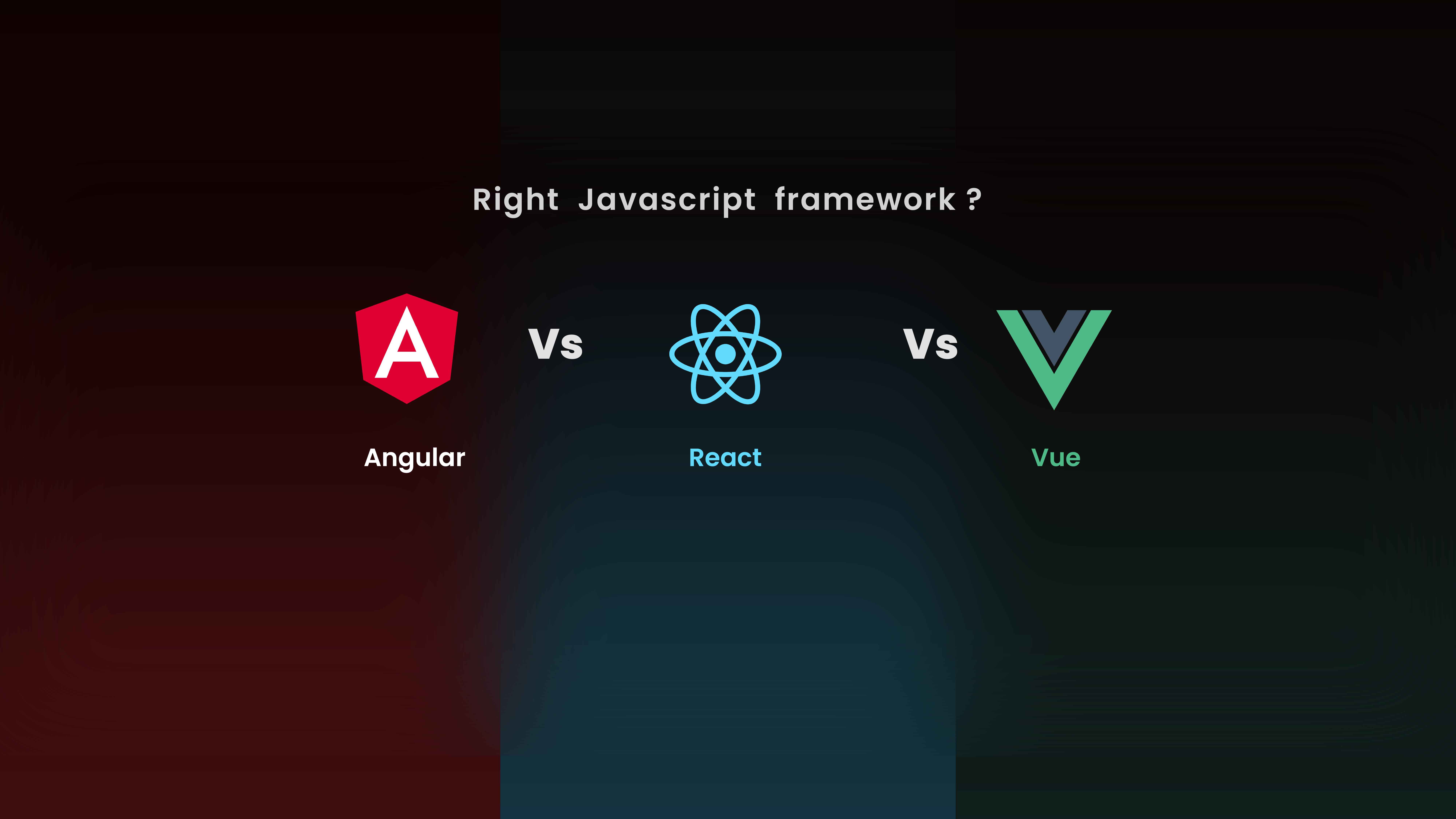Contact Us
+91 820 810 7030
30 Mar 2023
How to choose the right JavaScript Framework for your next application- Weighing React, Angular, & Vue

JavaScript is the first language that comes to a developer’s mind when you think of Front-end development. As of 2022, 98% of all websites use JavaScript as a client-side programming language.
There are over 24 JavaScript frameworks and over 83 libraries to choose from. Of them all, Angular, Vue, and React are by far the most widely used. Of the three, React has the largest market share at 35.9%, followed by Angular at 25.1% and Vue at 17.3% as of 2022.
That being said, for accuracy, React is not a JavaScript framework but a JS library.
For the uninitiated, let’s take a quick look at what JavaScript (JS) Frameworks and Libraries are.
A JS Library refers to a piece of reusable code that is written to accomplish one specific task. Applications can link to a library and then access either functions, objects, or methods depending on the functionality needed. The advantage of a Library is that it eliminates the need to rewrite code, resulting in efficient and error-free coding.
A JavaScript framework, on the other hand, is a JS code library set that provides developers with pre-written codes to perform routine programming tasks. As the name implies, they are tried and tested tools that provide you with a framework to construct scalable and interactive web applications.
Angular vs. React vs. Vue - How Do They Compare, and When to Use What?
Angular
Angular was developed by Google and was released in the year 2010. It is a TypeScript-based JavaScript framework which is a simplified version of JavaScript that makes coding a breeze and makes it easy for developers to pick up on faulty code.
Pros Of Angular
- Angular offers the best bang for the buck.
- Angular uses a relatively simple architecture, making it easier to code lightweight apps quickly.
Cons Of Angular
- Angular has a steep learning curve and is not a good framework for SEO.
- Its documentation is not updated regularly, which added to the problem.
- Angular is not the best choice for building cross-platform apps.
React
React is a Library that Facebook created in 2013.
Being a library and not a framework means that you completely control your application and can incorporate parts of the library you need, which is not an option when using frameworks. This gives React a huge advantage over Angular if a customizable website or application is needed.
Pros Of React
- React has clean and simple code, making it SEO-friendly due to negligible page load times.
- React performs extremely well in cross-platform workflows.
Cons Of React
- React requires a strong knowledge of JSX.
- Frequent updates can lead to tools becoming obsolete often.
Vue
Vue is a JavaScript framework created by an ex-google employee called Evan You. It is an overlap of both Angular and JS, which makes it extremely simple to pick up if you are familiar with either Angular or React. It is a tiny framework of only 21kb, which makes it by far the best when it comes to performance among the three.
Pros Of Vue
- High website performance.
- Robust error reporting functionality.
Cons Of Vue
- There are no large-scale projects to learn from.
- Vue is known to have issues with IOS and Safari.
How Do They Compare?
Here is a quick comparison of the three to help you decide which is the for your project.
| Angular | React | Vue | |
|---|---|---|---|
| Released in | 2010 | 2013 | 2014 |
| Language | TypeScript | JavaScript | JavaScript, TypeScript |
| Framework Type | Full-featured framework | Library | Progressive Framework |
| Learning Curve | High | Moderate | Easy |
| Performance | High | Fast | Fast |
| Data Binding | Two-way data binding | One-way data binding | Two-way data binding |
| Templating | HTML-based templates | JSX templates | HTML-based templates |
| Rendering | Server-side rendering | Client-side rendering | Client-side rendering |
| Community Support | Large and active community | Large and active community | Growing community |
| Popular Examples | Gmail, Forbes, Weather.com | Facebook, Netflix, WhatsApp | Behance, Grammarly |
Summing It Up
Each of the frameworks excels in its own right. What to choose primarily comes down to your project needs.
If you are looking to build large scalable apps and have an experienced team, go with Angular. If cross-platform performance is the primary factor, React is probably your best choice. For lightweight and intuitive apps and a novice development team, Vue is the way to go.
Being in the application development space for as long as we have, we have had the opportunity to leverage all these frameworks across a wide spectrum of projects.
Here are a few interesting case stories where we put these JS frameworks to task:



